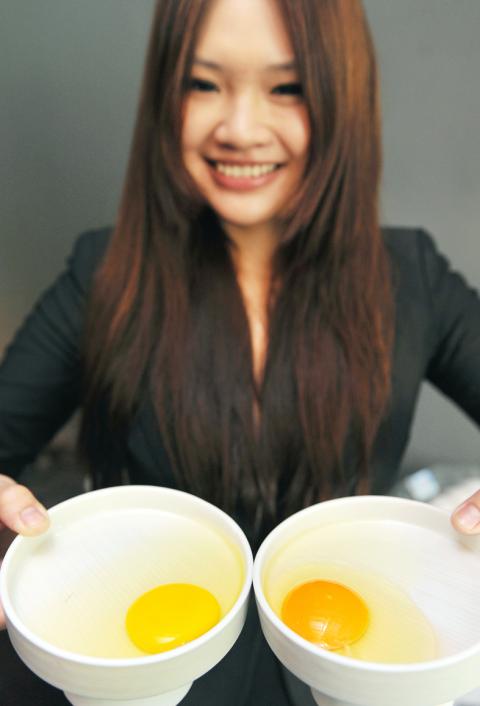Council of Agriculture Minister Chen Bao-ji (陳保基) yesterday visited one of the first companies in Taiwan, Shih An Farms (石安牧場), to have used EU standard techniques for raising egg-laying hens humanely and said that the council would promote the practice across the nation.
In February, civic animal welfare group Environment and Animal Society of Taiwan (EAST) revealed that an inhumane and unhealthy practice was prevalent in many chicken coops in Taiwan: that of raising two to four egg-laying hens in a battery cage only slightly bigger than a sheet of A4 paper and often injecting the birds with antibiotics or other drugs to enhance their growth.
According to the European Union Council Directive 1999/74/EC passed in 1999, the EU took more than ten years to phase out and ban the conventional battery hen cages across Europe.

Photo: Chien Jung-fong, Taipei Times
About 36.5 million egg-laying hens are raised in Taiwan each year, but most are kept in small cages without enough space to move, the company said, showing that the new hen-rearing facilities built according to the EU standard contained a nesting area, a resting space, a scratching area and a playground, with each hen being given at least 750cm2 of moving space.
“We are happy to see a company that can already achieve the EU standard,” Chen said. “And we hope that the example this company sets can attract more people to adopt more humane practices of hen-raising.”
However, when responding to whether Taiwan will also adopt regulations to ban the use of battery cages, Chen said: “It took the EU countries about twenty years to achieve the current situation of banning battery hen cages, but not all chicken coops have installed such advanced facilities.”
“Our research institutes will begin conducting research to figure out whether the imported facilities are adaptable to the climate and hen-raising practices of Taiwan, and after at least one-and-a-half years [the time needed for an egg-laying hen to grow] if the results are positive, the council will promote such practices” Chen said, adding that he “hopes to see the industry move in that direction.”

A preclearance service to facilitate entry for people traveling to select airports in Japan would be available from Thursday next week to Feb. 25 at Taiwan Taoyuan International Airport, Taoyuan International Airport Corp (TIAC) said on Tuesday. The service was first made available to Taiwanese travelers throughout the winter vacation of 2024 and during the Lunar New Year holiday. In addition to flights to the Japanese cities of Hakodate, Asahikawa, Akita, Sendai, Niigata, Okayama, Takamatsu, Kumamoto and Kagoshima, the service would be available to travelers to Kobe and Oita. The service can be accessed by passengers of 15 flight routes operated by

MORE FALL: An investigation into one of Xi’s key cronies, part of a broader ‘anti-corruption’ drive, indicates that he might have a deep distrust in the military, an expert said China’s latest military purge underscores systemic risks in its shift from collective leadership to sole rule under Chinese President Xi Jinping (習近平), and could disrupt its chain of command and military capabilities, a national security official said yesterday. If decisionmaking within the Chinese Communist Party has become “irrational” under one-man rule, the Taiwan Strait and the regional situation must be approached with extreme caution, given unforeseen risks, they added. The anonymous official made the remarks as China’s Central Military Commission Vice Chairman Zhang Youxia (張又俠) and Joint Staff Department Chief of Staff Liu Zhenli (劉振立) were reportedly being investigated for suspected “serious

ENHANCING EFFICIENCY: The apron can accommodate 16 airplanes overnight at Taoyuan airport while work on the third runway continues, the transport minister said A new temporary overnight parking apron at Taiwan Taoyuan International Airport is to start operating on Friday next week to boost operational efficiency while the third runway is being constructed, the Ministry of Transportation and Communications said yesterday. The apron — one of the crucial projects in the construction of the third runway — can accommodate 16 aircraft overnight at the nation’s largest international airport, Minister of Transportation and Communications Chen Shih-kai (陳世凱) told reporters while inspecting the new facility yesterday morning. Aside from providing the airport operator with greater flexibility in aircraft parking during the third runway construction,

American climber Alex Honnold is to attempt a free climb of Taipei 101 today at 9am, with traffic closures around the skyscraper. To accommodate the climb attempt and filming, the Taipei Department of Transportation said traffic controls would be enforced around the Taipei 101 area. If weather conditions delay the climb, the restrictions would be pushed back to tomorrow. Traffic controls would be in place today from 7am to 11am around the Taipei 101 area, the department said. Songzhi Road would be fully closed in both directions between Songlian Road and Xinyi Road Sec 5, it said, adding that bidirectional traffic controls would